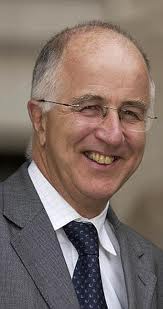Delfi.lt, Lithuania’s principal internet news portal, publishes on its website pseudonymously signed long comments in the format of proper news and opinion pieces. Such items, sometimes bereft of any actual author’s name (and responsibility), are thereby given the higher status of signed articles that carry the aura of an editor’s hand or editorial approval, in contrast to the free-for-all characteristic of numbered comments or talkbacks added at the end of a proper article. In other words, such items ascend to higher respectability, irrespective of Delfi.lt’s disclaimer confirming that opinion pieces represent only the writer’s views.
Human Rights
Delfi.lt publishes (pseudonymous) defense of neo-Nazi youth
How to hold an academic conference in a Soviet (and occasionally, in a post-Soviet) milieu
O P I N I O N
by Geoff Vasil
1. Line up the names of people who agree with you and are ideologically reliable or beholden to you for their ticket there and back. Best to use locals as far as possible with a big-wheel foreign invitee or two, provided they’re safe.
2. Do some stuff, make a program, maybe provide a tour to foreign academics, get them sauced. The program of events can be created on the fly, tailored to meet the needs of attracting the right set of people, using up funds allocated, etc. Be creative.
Genocide Center Official defends neo-Nazi march
A high official of the Genocide Research Center, Ričardas Čekutis, today published an article defending the recent neo-Nazi march in central Vilnius. Lithuania’s major daily, Lietuvos rytas, had identified him ten days ago as one of the key participants and organizers of the 1000-strong March 11th 2011 neo-Nazi march that proceeded through the center of Vilnius on the country’s Independence Day, with the participation of a member of parliament, and a permit from the municipality of Vilnius. The Jewish Community of Lithuania has protested the march on its own website (English translation here).
Baltic Media: Covering the Fascist Marches, or Covering Them Up?
O P I N I O N
by Geoff Vasil
This year Lithuanian neo-Nazis organized by Marius Kundrotas, Ričardas Čekutis and Julijus Panka with Lithuanian MP Kazimieras Uoka as their mascot marched in Kaunas on February 16 and through central Vilnius on March 11. February 16 is the old, pre-World War II national day of independence while March 11 is the date in 1990 when the Lithuanian Supreme Soviet voted to restore national independence and exit the Soviet Union.
Neo-Nazis March in Central Vilnius on Lithuania’s Independence Day (with government permission and police escorts)
- EYEWITNESS REPORT
- by Sebastian Pammer
- PHOTOS BY SEBASTIAN PAMMER
From the internet site www.tautos-balsas.lt I learned that the march of Lithuanian nationalists would start today at 4 PM (1600 hours) at Cathedral Square in the very heart of Vilnius, where the city’s central boulevard, Gedimino Prospect, begins its ascent toward the nation’s Parliament at its other end.
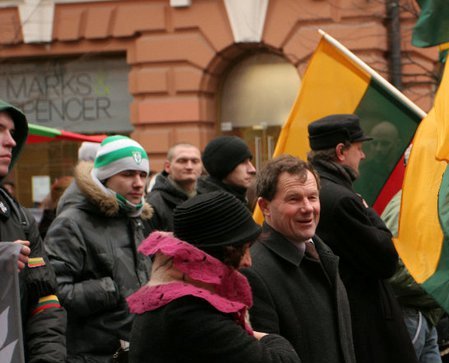
Kazimieras Uoka, at right, a member of the Lithuanian parliament from the Conservative party in power, was one of the leaders of the massive neo-Nazi march on the capital’s main boulevard on the country’s Independence Day.
I was shocked to see that one of the march’s leaders was a member of parliament from the ruling Homeland Union faction of the Conservative alliance in power (whose prominent Jewish member actually signed the Prague Declaration in 2008!). MP Kazimieras Uoka was marching at the very front. In 2010 Uoka’s pro-neo-Nazi activities were in evidence more than once. He had taken out the permit for last year’s Nazi march (Leonidas Donskis’s comment on that here) and then in May, he jumped the barricades to disrupt the wholly peaceful Gay Pride parade in Vilnius.
Reply to Rokas Grajauskas: Condemnation of Communism Does Not Require Submission to Double Genocide, Holocaust Obfuscation, or the Recent Deterioration in Civil Society and Free Speech in Lithuania
O P I N I O N
by Dovid Katz
NOTE: This reply to the Lithuanian Foreign Policy Review paper by Rokas Grajauskas first appeared on the website of LFPR (direct link here).
[UPDATE of 1 March 2013]: The journal refused to publish a reply, but after an intervention from Prof. MEP Leonidas Donskis it was uploaded on the journal’s website for a time, and then removed.]
◊
Rokas Grajauskas cites me in his recent article on these pages as invoking the notion Holocaust Obfuscation (a term I proposed at a London seminar in February 2008, then formally in 2009) to refer to “the efforts of the post-Communist countries to revive the memory of Stalin’s crimes.” Nothing could be further from the truth. The web journal I edit, DefendingHistory.com, although dedicated primarily to the battle against trivialization of the Holocaust and the concomitant racism and antisemitism of the new Far Right in Eastern Europe, contains a page on Soviet crimes, where I wholeheartedly embrace such Council of Europe Parliamentary Assembly resolutions as 1096 (1996) and 1481 (2006), which wisely and rightly condemn Soviet crimes. It is vital that the full extent of these crimes be documented, the victims honored, the subject properly taught in international curricula, museums and memorializing institutions established, and justice pursued to the full extent of law. It is every bit as vital that Western commitment to Baltic security and independence remain unwavering, what with a huge unpredictable neighbor “with a certain past” (and unclear future) situated to the immediate east.
‘Today on the Street, Tomorrow in Parliament’ is neo-Nazi Rallying Cry in Kaunas
Neo-Nazi marchers in Kaunas today, Lithuania’s February 16th Indendence Day celebration, carried a banner reading (in translation): ‘Today in the Street, Tomorrow in Parliament’. The reference was both to the general goal of the movement, and in reference to a neo-Nazi employed as an assistant to a prominent member of parliament (the Seimas), herself formerly the head of the antisemitic Genocide Center, who has announced his own candidacy in forthcoming municipal elections.
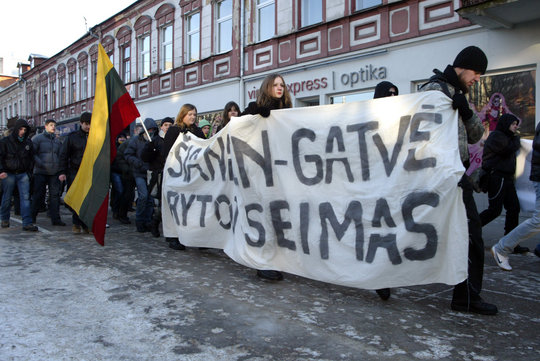
'Today on the Street, Tomorrow in Parliament' reads this sign displayed during the neo-Nazi march in Kaunas on 16 February 2011. Photo by N. Povilaitis (Lrytas.lt).
By apparent agreement with authorities, the marchers brandished swasticals rather than classical swastikas.
Report and images on Lrytas.lt.
Fascism in National Cellophane
O P I N I O N
by Nida Vasiliauskaitė
There is a view that pro-fascist tendencies in Lithuania are nothing more than a bubble blown by the New Left, an informal intellectual and political movement (not a party), that it is a case of “Communist slander” aimed at peaceful and likeable patriots: those who simply love their Homeland, are proud of it and who—unlike the angry folks from the New Left who are “attacking” good people for no reason at all—do not seek enemies (and do not find them), degrade nobody and are a threat to nobody.
No, for them everyone is a friend. (How different they are from, for example, Nida Vasiliauskaitė, who, as they will tell you, “hates everyone” simply and purely at her own whim and out of bad will, or because she has been “paid” by all the comrades of “Brussels” and “Moscow” banded together. They emphasize that which unites, not that which divides…)
MEP Donskis challenges attacks on European Parliament’s queries on Lithuanian Parliament’s homophobic legislation
In a new essay, published in Lithuanian on 2 February , and in English on 7 February 2011, MEP Professor Leonidas Donskis takes to task Lithuanian commentators and politicians who have attacked the European Parliament for daring to criticize proposed new homophobic legislation making its way through the Lithuanian Parliament. He also takes note of the unfortunate role of state security services in realms they should have nothing to do with in an EU democracy, while bemoaning their total lack of concern with politicians and their top advisors who flirt openly with neo-Nazi ideology and policies. He writes: ‘Perhaps it is time to worry about the stench from the rising tide of fascist ideas and interpretations of history in our political life and media instead.’ Full text here.
Who Got Stupid, the European Parliament or Us?
O P I N I O N
by Leonidas Donskis
The European Parliament recently reacted by way of a resolution to a piece of draft legislation by a member of the parliament of the Republic of Lithuania, Petras Gražulis. If enacted, his legislation would have de jure expelled from public life homosexual citizens in the country. Since then, several comments have already rung out in our public space in Lithuania, whose essence, despite differences in levels of nuance, is similar: that the European Parliament is allegedly interfering too minutely and grandly in the affairs of the Republic of Lithuania; that it is allegedly violating the principle of subsidiarity; that it is applying double standards because it was so careful in commenting upon the sins of France in the sphere of human rights but ruthlessly attacks the new member states, first and foremost Lithuania.
Andrius Navickas wins ‘Person of Tolerance’ Award in Lithuania
Journalist, editor and human rights champion Andrius Navickas was awarded this year’s Person of Tolerance award in a ceremony in Kaunas today. The annual award, founded by Open Society Lithuania’s founding director Dr Irena Veisaitė, goes to a personality who actively and courageously fought for tolerance in Lithuanian society.
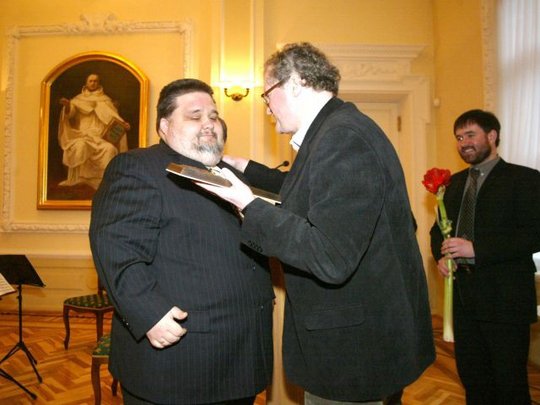
Andrius Navickas (left), editor of Bernardinai, accepts the Person of Tolerance award from MEP Professor Leonidas Donskis at a ceremony in Kaunas on 5 February 2011. Image: N. Povilaitis / Lrytas.lt
Statement on ‘Double Genocide’ issued by Society for the Promotion of the European Human Rights Model Abroad
In a statement published today on its website, the Society for the Promotion of the European Human Rights Model Abroad takes note of the antisemitic foundations of the new ‘Double Genocide’ movement in Eastern Europe, and particularly in the Baltic states. It also takes the Lithuanian government to task for the 2010 law that effectively threatens imprisonment for those who reject ‘Double Genocide’.
In Major Speech to UK’s Parliament, MP MacShane Confronts Hungarian Injustice, Baltics’ Double Genocide Campaign
Denis MacShane, the veteran Labour Party member of the British Parliament for Rotherham, gave a major speech on antisemitism in the House of Commons yesterday. (Full text of Denis MacShane’s 20 January speech.)
In contrast to politicians across Europe who pay lip service to the battle against antisemitism ‘in general’, Mr MacShane emphasized the actual issues of the day, including two major and ongoing scandals sadly involving member states of the European Union in the new accession eastern area. In both cases, his speech serves to overcome the veil of reticence sometimes encountered when it comes to criticizing Britain’s partners in the EU, NATO, the OSCE and other international organizations.
Polish Ambassador to Lithuania HE Janusz Skolimowski Speaks Out Boldly on Latest Holocaust Denial
VILNIUS—The following is the text of HE Polish ambassador Janusz Skolimowski’s 26 November letter in Veidas, which the ambassador copied to Lithuania’s Minister of the Interior. This authorized English translation was kindly provided to Defending History by the Embassy of Poland here. The letter followed one by seven other ambassadors regarding the same events in Lithuania.
From: Ambassador of the Republic of Poland in Vilnius
To: Editor-in-Chief of the weekly magazine “Veidas”
For the attention of: Mr. Raimundas Palaitis, Minister of the Interior of the Republic of Lithuania
Concerns: Article of Petras Stankeras dated November 14th, 2010:
“The International Military Tribunal at Nuremberg — the biggest legal farce in history”
Dear Mr. Editor-in-Chief,
Bloomington Scholar Exposes Racist Images in Popular Language Manual
Christine Beresniova, a doctoral scholar at Indiana University (Bloomington) has exposed the disturbingly racist images in a popular Lithuanian language manual that have disturbed foreign Lithuanian language students for many years. The public disclosure is reported today in an article in the main daily newspaper in Vilnius, Lietuvos rytas.
The most infamous image features two pairs of stereotypes. There is the Lithuanian woman in national folk costume and a crown on her head, and as foreign counterpart, a bare-breasted black woman in Africa with weird headgear. The caption to the illustration translates ‘This woman is a Lithuanian, and that one is an African’, as if Africa is a country, one-to-one comparable to ‘Lithuania’.
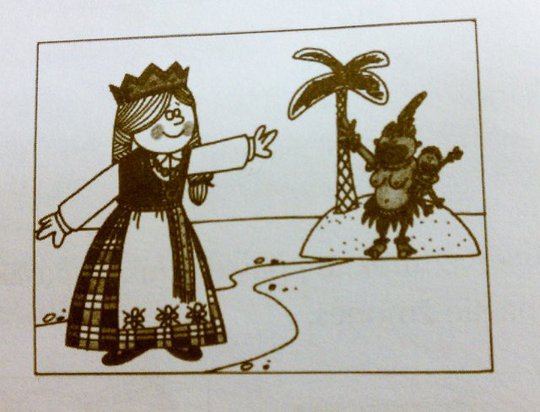
Lithuania and Tolerance
O P I N I O N
by Geoff Vasil
2010 was an astonishing year for human rights in Lithuania. Toward the beginning of 2010 there were public demonstrations in the capital by self-designated patriotic youth, decked out in various paramilitary costumes, in plain clothes bearing variations on swastikas and wearing white arm bands. These Lithuanian neo-Nazis marched across the main streets and squares in Vilnius on independence day (March 11th), made a showing to protest against a silent march of people from the main square to a cemetery to honor the dead on Soviet Victory Day (May 9th), and most spectacularly managed to outnumber 10 to 1 Lithuania’s first gay pride march (May 8th) with a violent mob throwing objects, hurtling insults and proudly waving flags with pseudo-swastikas behind police lines. The gay pride march almost didn’t happen, as it hadn’t many years in a row, because of bureaucratic impedance from the Vilnius municipality over issuing a permit and from law enforcement and the parliament. The neo-Nazi marches, on the other hand, had support from within parliament, MPs who personally asked for, and got, permits from the city for a march. Several MPs also came to the anti-gay pride protest with bullhorns, stormed police barriers and generally foamed at the mouth, caught on camera.
When a ‘Human Rights Association’ accepts and repeats the antisemitic canards in town
O P I N I O N
by Dovid Katz
“Also, it has been started to require the sentence of the citizens of the Jewish nationality ― Yitzhak Arad, Fania Brantsovsky and Rachel Margolis, as these citizens (former Soviet guerrillas) have organized the massive slaughter of civilians in Kaniūkai Village, Lithuania (killing 38 civilians) on 29 January 1944. Attention should be paid to the fact that the very Y. Arad has departed to Israel.” — from the statement just published by the Lithuanian Human Rights Association (LHRA), signed by ten of its leading experts and approved by its committee.
Where is that Line?
O P I N I O N
by Leonidas Donskis
An unattributed piece that just appeared in the weekly magazine Veidas (it turned out the author does actually exist and even works at the Lithuanian Interior Ministry), intended to discuss the Nuremberg trial, and has become a new delimiter in our political life and public space. For the first time since the restoration of independence in 1990, the Holocaust has been publicly and openly denied in Lithuania (see here).
Uncanny Darkness: Impressions of a Public Debate in Vilnius
O P I N I O N
by Algirdas Davidavičius
Algirdas Davidavičius, author of the text formerly published here [an essay and memoir on the December 8th 2010 Holocaust discussion held at the Misterija cafe on Totoriu Street in Vilnius, previously announced on Facebook and elsewhere as a public event] hereby apologizes to Mr Arūnas Brazauskas for inaccurately representing his opinion, and, under legal threat, has [on 16 December 2010] removed the text from DefendingHistory.com.
The author of the removed text also hopes to take and publish in the foreseeable future an interview with Mr Brazauskas on a number of questions mentioned in the formerly published text, and urges Mr Brazauskas to express his opinions more clearly and unequivocally.
- Algirdas Davidavičius
- Vilnius
- 16 December 2010
Shifting Dates for the ‘Public Meeting’ to ‘Overhaul’ European Textbooks for Red-Brown Equivalence
November 16th 2010 has come and gone, but the ‘Public Meeting’ which the Red-equals-Brown lobby in the European Parliament announced extensively the old fashioned way — by disseminating a flyer that is not posted on the internet — seems to have been postponed. The flyer, echoing both the language and spirit of the Prague Declaration, called for overhaul of (all?) European Union textbooks ‘so that children and young people could learn and be warned about Communism and its crimes in the same way as they have been taught to assess the Nazi crimes’.
A sanitized formulation that is posted on the web, in a style uncharacteristic for Brussels exactitude, notes that the public meeting is ‘scheduled for November’ and makes reference to a group meeting held on 22 September.
An even more sanitized formulation announces the event for the 29th of March 2011, referring to a ‘group meeting’ held on 10 November.
